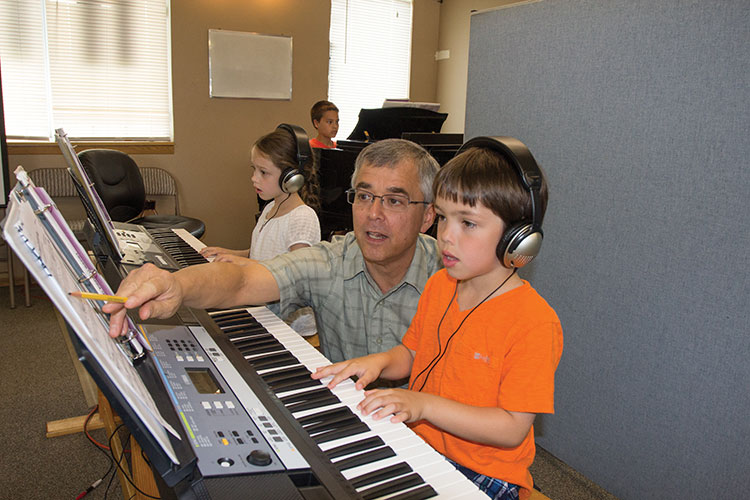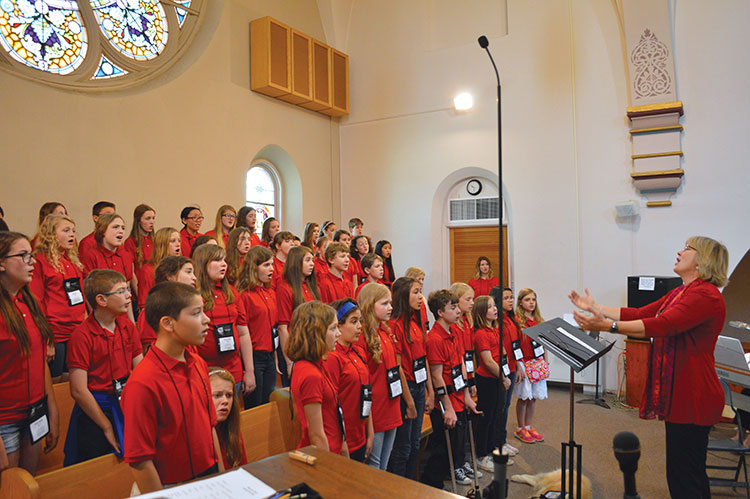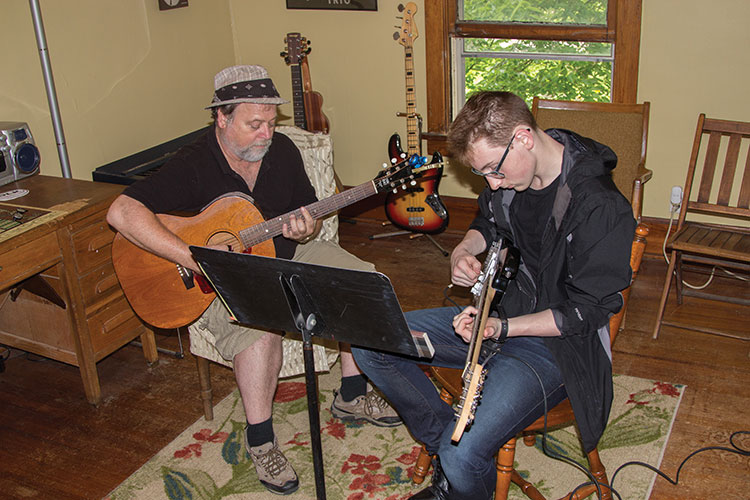| 2015 Q2 | story by LIZ WESLANDER | photos by STEVEN HERTZOG |

Eric Sakumura instructs Eli Stone
While almost everyone enjoys listening to music in one form or another, many do not fully appreciate the potential benefits that learning to play music can have for both individuals and the community. A number of local music-education businesses and organizations say that more people should take “note” of the positive effects of music education, including building life skills, enhancing cognitive ability and creating community connections.
Lawrence Piano Studio
Eric Sakumura, Owner and Founder of Lawrence Piano Studio, has been providing piano instruction in Lawrence for 32 years. Sakumura has Bachelor’s degrees in both Piano Performance and Chemistry from the University of Kansas, and first started teaching lessons while he was working on his teaching certification in chemistry. Sakumura and his team of 10 assistant piano instructors, most of whom are music majors from KU, teach group lessons for younger children and individual lessons for people of all ages. While Lawrence Piano Studio has a number of advanced piano-performance students, Sakumura said that cultivating life skills and an appreciation for music is the studio’s primary goal.
“I don’t have all of my students on what I would consider to be a concert track,” Sakumura said. “That’s not really the point. I think the point is that you enrich your soul by learning to play music and then you decide how you want to incorporate it into your life. If we can make this an enjoyable process, then students will have skills that they can draw on for the rest of their lives.”
The curriculum at Lawrence Piano Studio includes note reading, music composition, blues improvisation and performance. Sakumura compares the process of learning to read music to learning a new language, which is why he likes to include composition in the studio’s instruction.
“I think that composition is a very important thing for students to participate in because you wouldn’t teach someone how to read without teaching them how to write,” Sakumura said. “The students learn how to take the notes on the page and play them on the keys, so I want them to figure out something on the keys and then learn how to put the notes down on the page.”
Lawrence Piano Studio holds recitals each semester at the Lawrence Arts Center. While students are not required to participate, Sakumura encourages students to perform because it helps them learn to deal with nerves and leads to a sense of accomplishment.
“We are not looking for perfection by any means,” Sakumura said. “With performances I emphasize learning how to move on from mistakes when they happen, because they do happen.”
Sakumura said there are numerous studies that cite the benefits that learning to play music has on brain development and academic outcomes. He would love to see parents who have their children in multiple sports place one of those sports aside and invest that money in music lessons.
“Music makes for a more-rounded individual,” Sakumura said. “Over the years I’ve had probably thousands of people tell me that they took piano lessons when they were younger, and that they wish their parents would have never let [them]quit, but I’ve never run into someone who has told me they were really upset that their parents made them learn how to play the piano.”
Lawrence Children’s Choir
Lawrence Children’s Choir is another long-standing organization dedicated to musical education in Lawrence. Founded in 1991 by sisters Janeal Crabb Krehbiel and Marilyn Crabb Epp, LCC offers choral education for children in preschool through 10th grade via various levels of choirs, all of which meet at West Middle School. Three choirs for younger students, called Capo, Cadenza and Choristers focus on developing singing fundamentals such as rhythm, tone and basic music reading.

Colorado Trip St. Fidelis and Hays
LCC’s Tour Choir is the organization’s top-level, audition-based choir for children in fifth through 10th grade and is made up of 80 students from Lawrence and surrounding communities. The Tour Choir rehearses for 90 minutes each week, learning more than 20 songs each year, many of which are in four-part harmony and/or foreign languages. As the name suggests, LCC Tour Choir travels throughout the state and country for performances, and it has also performed in Latvia, Lithuania, Germany and England in the past several years.
Lawrence Children’s Choir’s Artistic Director Carolyn Welch said that because most elementary schools do not have school choirs outside of regular music class, Lawrence Children Choir’s lower level ensembles fill a niche for younger children who enjoy and excel at vocal music. At the middle school and high school level, Lawrence Children’s Choir is distinct from school choirs in the same way that club athletic teams are distinct from school athletic teams, Welch said.
“We have excellent programs in our public school, but LCC is operating on a different level because we have some of the best singers from all of the schools,” Welch said. “We hope that the kids that sing in LCC take their additional experience back to their school ensembles and act as leaders.”
Like Sakumura, Welch believes that musical education cultivates numerous life skills. The Tour Choir’s 90-minute rehearsals require physical stamina and concentration, Welch said, and memorizing complex music and lyrics is a great mental workout. Lawrence Children’s Choir also hones manners, Welch said.
“Choir members are expected to be polite and delightful when we travel,” Welch said. “If they don’t have good manners when they leave on a trip, they certainly have good manners by the time they come back.”
Like many sports, choir also emphasizes teamwork, Welch said.
“I call choir the ultimate team sport. You have to work hard together to be very precise,” Welch said. “When you’re in choir it’s not about you; it’s about being part of the beautiful and wonderful whole.”
Americana Music Academy
Creating music with others is also a central theme at Americana Music Academy, a local non-profit with the mission of “carrying on the tradition of American roots music.” Americana operates out of a 3-story blue and pink historic house near 15th and Massachusetts Streets teaching individual music lesson and acting as a venue for community building and outreach.

Greg Pelligreen giving Tristan Delnevo blues guitar lesson
Executive Director Peter Lague said that American roots music encompasses a number of musical styles that have been passed down via a variety of cultural communities in the U.S.
“We don’t exclude any variety of American music,” Lague said. “We teach rock, jazz, and blues in addition to the traditional folk, bluegrass, and mountain music.”
A staff of 14 teachers, most of whom work as part-time independent contactors for Americana, teach individual lessons in the many rooms spread throughout the Americana house. The instructors’ areas of expertise cover the spectrum of stringed instruments, as well as percussion, piano, singing and songwriting.
While lessons are Americana’s bread and butter, a calendar full of community jams and camps is its heart and soul.
Americana hosts a weekly Saturday jam, open to anyone in the community, where a group of musicians that can range in number from eight to 30 gather to play folk and rock music. Americana also hosts regular jams specifically for beginning musicians as well as a ukulele jam, an old-time fiddlers’ jam and a monthly songwriters’ circle.
“You can sit at home and play by yourself, and yes it helps the brain and helps the mechanics and everything like that,” Lague said. “But when you step out of your comfort zone and play with others, you start to create something that’s completely different. It’s not just about you playing, it’s about sharing something with somebody else, and that’s where the community part comes in.”
Americana puts on day camp sessions during the summer where children can explore American roots music, folk art and dance. The camp includes opportunities for making instruments out of simple materials like clay and gourds and also gives kids the chance to make music together in a relaxed setting.
“A lot of funky instruments that came out of the American tradition of making simple instruments,” Lague said. “It’s the tradition part of that that we want to keep going. We don’t want to lose that connection to community and creativity.”
The Benefits of Music Education Scientific research has found that:
• Playing music can help students improve grades
and test scores
• Music students perform better on college entrance
exams
• Music majors are the most likely group of college graduates to be admitted to medical school
• Playing music can help under-achievers
• Playing music can make a person emotionally
healthier
• Music can help stroke victims regain language
capabilities
Source: A Summary of Current Scientific Literature Concerning Music and the Mind. Compiled by The Foundation for Universal Music Literacy.

2 Comments
Enjoyed every bit of your blog post.Thanks Again. Great.
Hi! I know this is kind of off topic but I was wondering which blog platform are you using
for this site? I’m getting fed up of WordPress because I’ve had issues with hackers and I’m looking
at options for another platform. I would be fantastic if you could point me in the direction of a good platform.